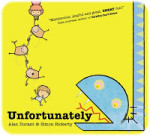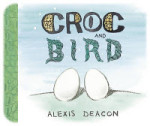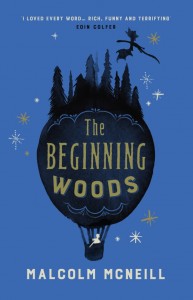 Unexplained disappearances. A strange boy whom nobody wanted. A world so scared of the freedom of dreaming and imagining that they are willing to burn all the books. A wood where darkness and fairy tale creatures lie. A journey to find one’s truth and save the world in the process. Here are a few ingredients in the complex recipe that is The Beginning Woods (Pushkin Press). It is a slow-cooking type of recipe, one in which the end result, the resolution, creeps up on its reader.
Unexplained disappearances. A strange boy whom nobody wanted. A world so scared of the freedom of dreaming and imagining that they are willing to burn all the books. A wood where darkness and fairy tale creatures lie. A journey to find one’s truth and save the world in the process. Here are a few ingredients in the complex recipe that is The Beginning Woods (Pushkin Press). It is a slow-cooking type of recipe, one in which the end result, the resolution, creeps up on its reader.
Fascinating, immersive and highly unsettling, McNeill’s story is tightly woven and complex. The ‘rationalising’ of the Vanishings by the authorities which result in dreaming and creative processes being censored is chilling because it resonates with some of the things one might see on the news today. This deeply philosophical underlay of the tale and its multilayered narrative make The Beginning Woods possibly more suited to the more astute reader therefore. Comparisons with Cornelia Funke and Margo Lanagan will come to mind for many readers, particularly because of how the ordinary and extraordinary, fairy-tale worlds collide, merge and intertwine at times. The link with Lanagan was stronger for me, because like Lanagan’s books. The Beginning Woods wove itself into my dreams and disturbed my sleep. The Beginning Woods is rich, peculiar, clever andexactly the kind of children’s literature of which more is needed.
There a lot of of wonderful quotes relating to story and books throughout the book, but here is my favourite:
When you read … you discover who you really are. You find traces of yourself, little pieces you didn’t know were there. (p 73)
I am delighted to welcome Malcolm McNeill to Library Mice as part of The Beginning Woods blog tour for a Fabulous Five special.
Malcolm was born in England in 1976 and grew up in Scotland. Since then he has traveled widely in the world, but recently decided it would be best to return to his roots. The Beginning Woods is his first book and interestingly was translated and published in German before making its way to us.
You can follow him on Twitter: @malcolmjmcneill
***
A life in Books
by Malcolm McNeill
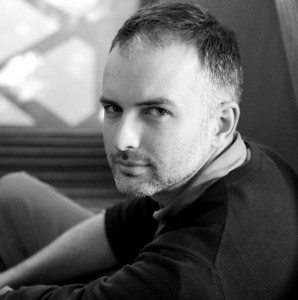
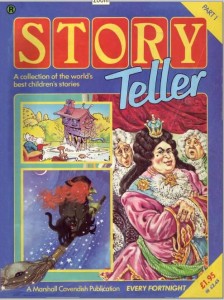 Storyteller
Storyteller
Marshall Cavendish
Between the ages of about eight and twelve, my dearest possession was a Fisher-Price portable cassette player. I carried this monstrous device about with me so I could listen to stories from the Marshall Cavendish series of partwork magazines, released in the 1980s and unmatched since.
Every fortnight I fought my way through the hordes of screaming children who clamoured round the doors of the local RS McColl, eager to get their hands on the latest richly-illustrated magazine, which came, like no other magazine on the planet, with a cassette sellotaped to the cover:
Each cassette was a treasure trove of stories fairy tales, myths, poems, legends, new writing and classics, all brought to life by a Who’s Who of acting talent. My favourite? Joss Ackland’s reading of the The Selfish Giant, The Creation of Man, and the Oliphaunt.
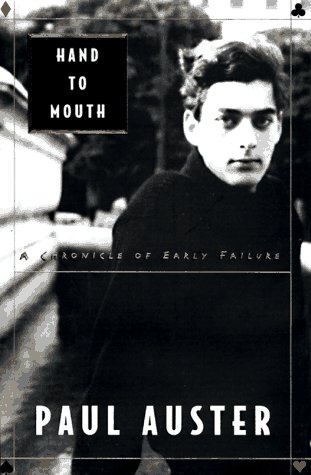 Hand to Mouth
Hand to Mouth
Paul Auster
When I first came to London, I moved into a flat in Bethnal Green a friend had left after being attacked by the man living directly above. So I had the place rent-free, until I got myself on my feet.
My friend had left quickly and not been back to pick up any of his stuff. I did the dishes when I arrived. Cleaned up. Unpacked my rucksack. Then sat down in front of his enormous television and watched cable for the first time in my life.
After a couple of weeks he came to clear the place out. He left a sofa in the living room and a bed in the bedroom—and Auster’s New York Trilogy in the back of a cupboard.
I read those books in those empty, dimly-lit rooms while London baked outside. It was an incredible synchronicity of life and literature. Auster’s world rose up out of the pages and transformed the world around me. I spent the days riding buses around London, going to various jobcentres. Basked in Kensington Gardens, sunning myself. Came upon the Pan statue without knowing it was there. I had no money and my clothes were falling apart: I patched my jeans with cut-up charity-shop cravats. Then drama school started. “You look like death,” remarked the director.
I never really escaped from Auster’s world. My twenties and early thirties were spent like one of his half-erased characters. Somewhere in the middle of it all, a friend gave me Hand to Mouth, Auster’s reflections on his early life as a writer, a description of poverty, ineffectiveness and dogged determination.
…once you accept the fact that you’re not fit for anything else, you have to be prepared to walk a long, hard road for the rest of your days.
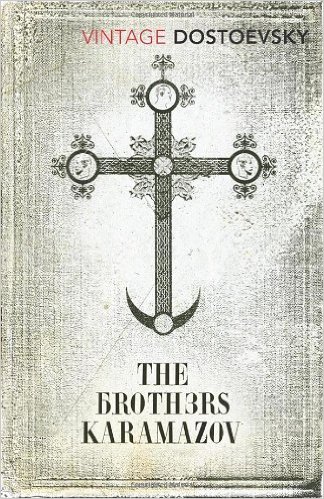 The Brothers Karamazov
The Brothers Karamazov
Dostoevsky
A house party. I was twenty-two. “So what do you like to do?” asked the girl. She was French, she was sharp. Best of all she was on the sofa beside me.
“Well, just normal things. Reading.”
“Do you have a favourite author?”
“I guess Dostoevsky.”
“Oh,” she said, rolling her eyes. “Everybody likes Dostoevsky.”
I went and sat in the bath. The idea that books had a hierarchy of cool made me want to chuck bottles at houses. It seemed illogical, that a writer could be so great he was sent into a negative trajectory.
I’ve always believed the best writing is done not from the desire to entertain or enchant, which is a secondary consideration, but from your condition, from how it feels to be a person in the world that you occupy. All my favourite writers seem to be writing from their condition, trying to answer some fundamental, burning question they have about themselves, or the world.
Reading The Brothers Karamazov was, in a sense, a mistake, because I knew when I finished it that I would never read a better book. That experience, like the first kiss, was now over.
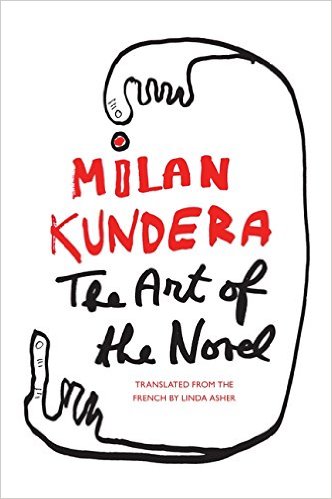 The Art of the Novel
The Art of the Novel
Milan Kundera
If people are Vanishing from the world, I asked myself one day, then why are they Vanishing?
At the time I thought I was Vanishing myself. My reading and my life, always intertwined, were bringing about a perfect storm of existentialism, drawing me away from the steady Anglo-Saxon pragmatism of George Eliot, Hardy and Dickens, to the continent: to Gide, to Hamsun (via Auster), to Sebald, and to Kundera.
Kundera was a “moment” for me in my awareness of the possibilities of playfulness, motif, and especially voice. Everything was explicit—he concealed nothing, not even his own presence. The cleverness, the examination of a person’s nature through a single image or analysis of a phrase—it was all new and exciting.
This particular book opens with an essay that gave me the answer I was looking for:
The rise of sciences propelled man into the tunnels of the specialized disciplines … and he plunged further into what Husserl’s pupil Heidegger called, in a beautiful and almost magical phrase, “the forgetting of being.”
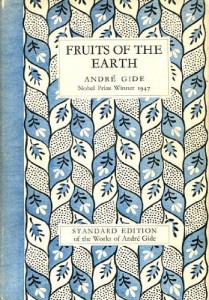 Fruits of the Earth
Fruits of the Earth
André Gide
When I was twelve, I sat a scholarship examination for boarding school. During the exam, an English teacher asked me about my interests. I told him I liked looking at the stars. “And are you a scientist?” he asked. “Or a dreamer?”
I remember smiling, because it was suddenly pleasing to think about myself as an external object. “Who am I?” was a question I’d never thought to ask myself. I knew at once I was a dreamer.
Boarding school was a compressive force, a compaction, a deep but narrow education. I was, in effect, institutionalized. For years after leaving, I dreamed I was allowed to “stay on” for one more year.
Looking back on this state of affairs, Gide’s Fruits of the Earth stands out as a moment of liberation, when something entirely new entered my mind. It had the effect of a hallucinogen.
There are things that are commonly said, then there are things which you will only ever hear once, from one source, a person or a book—a message that will never be repeated.
With Gide, the message wasn’t an argument or a philosophy, although in a sense the book is nothing but messages and philosophy. It was more of a mood, or a way of existing, that seemed entirely absent from the world around me.
***
Thank you so much, Malcolm for this selection. I am really pleased to see Kundera feature, whose books I read voraciously as a teen.
The Beginning Woods is published by Pushkin Press and is out now. You can purchase a copy here.
Source: review copy from publisher

